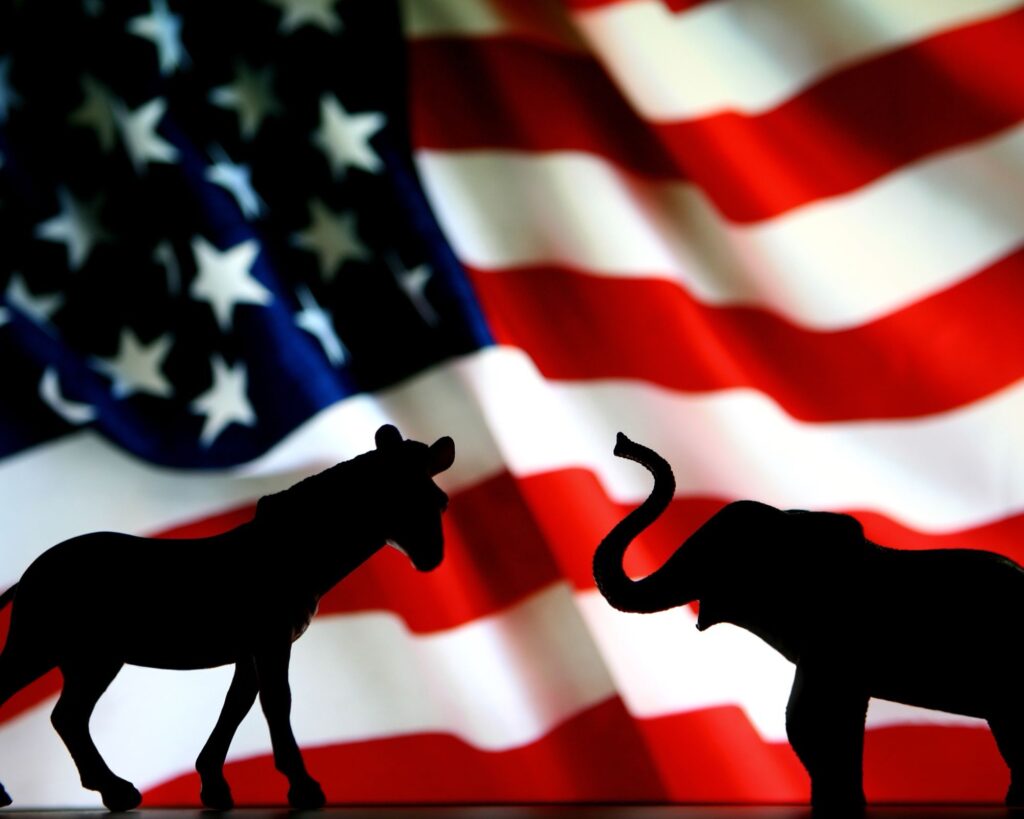In today’s charged political climate, understanding the political leanings of top U.S. companies is not just intriguing—it’s essential. Every purchase and investment can be seen as a political statement, making the affiliations of these corporate giants more significant than ever.

Corporations influence not only the economy but also the political landscape through donations, public statements, and affiliations. This influence can significantly impact consumer choices, employee relations, and the brand’s overall reputation. But why is it important for the average person to understand these corporate political allegiances? It boils down to the profound impact these leanings can have on our daily decisions and the broader societal implications.
Our exploration into the political landscapes of America’s leading companies is rooted in a comprehensive analysis. We’ve selected companies based on their market dominance, public visibility, and their impact on American society and politics. By examining public records of donations, official statements, and affiliations, we aim to provide a clear picture of where these titans stand on the political spectrum.
This journey is not just about identifying political donations but understanding the ripple effects of these affiliations on consumer behavior and public policy. Social media interactions on political accounts offer a window into the political engagements of corporate America. Analyzing interactions on Joe Biden’s fishy Facebook account provides insight into how companies engage with political figures and issues.
The entertainment industry, often seen as separate from corporate America, also plays a significant role in shaping political opinions. The political affiliations of Hollywood’s leading actors and popular singers influence public perception and contribute to the political dialogue, highlighting the interconnectedness of culture, entertainment, and politics.
Moreover, companies also express their values and ideologies through the products they sell and the messages they promote. For instance, merchandise like the “American by Birth, Christian by Grace Hoodie” showcases how corporations can embody and promote specific cultural and political ideologies, appealing to particular consumer segments.
As we delve deeper into the political orientations of these corporations, it’s important to remember that this exploration is about aligning our consumer and investment choices with our values. This series aims to empower you with information to make informed decisions in a politically polarized marketplace.
Stay tuned as we reveal the political hues of America’s corporate landscape, encouraging informed decision-making and active engagement in the intersection of commerce and politics.

Criteria for Analysis: Deciphering the Political Palette
To paint an accurate picture of the political landscape within corporate America, we’ve employed a meticulous selection process and criteria for our analysis. Understanding the political leanings of the top 20 U.S. companies required not only identifying their public donations and statements but also interpreting the significance of these actions within a broader political and societal context.
Selection of Companies: Our analysis focuses on companies with significant market influence and public visibility, which play pivotal roles in shaping both the economy and societal norms. These entities were chosen based on their ability to influence public policy, their history of political engagement, and their impact on American culture and values.
Data Sources and Types: The backbone of our investigation lies in the thorough examination of public records, including FEC (Federal Election Commission) filings, corporate press releases, official statements, and notable affiliations with political causes or campaigns. Additionally, we’ve looked into:
- Public Statements and Endorsements: How companies publicly align themselves with political parties or causes through official communications.
- Financial Contributions: Direct donations to political campaigns, PACs (Political Action Committees), and other organizations that support specific legislative agendas.
- Affiliations and Lobbying Efforts: Involvement in lobbying activities aimed at influencing legislation, policy, or regulatory decisions in favor of certain political interests.
Balancing the Scales: Recognizing that companies might support causes across the political spectrum, we’ve also paid attention to those with a more balanced approach to political engagement, offering a nuanced view of corporate America’s political diversity.
Into the Political Spectrum: A Tale of Two Parties
As we delve into the political orientations of America’s corporate titans, it becomes evident that their support often mirrors the divided nature of the country’s political landscape.
Companies with Leanings Towards the Democratic Party:
Our analysis reveals that a significant portion of the top 20 U.S. companies show a predilection towards supporting the Democratic Party. This support manifests through various channels, including financial contributions to Democratic candidates and causes, public endorsements, and active participation in initiatives aligned with Democratic values. These companies often advocate for policies related to environmental sustainability, social justice, and healthcare reform, reflecting a broader alignment with progressive agendas.
The Republican Affiliation:
Conversely, another set of companies within our top 20 list demonstrates a clear inclination towards the Republican Party. These entities tend to support policies favorable to business interests, such as tax cuts, deregulation, and conservative social policies. Their contributions and public statements often underscore a commitment to traditional economic principles and a cautious approach to regulatory change.
The Middle Ground: Balanced Supporters:
Notably, a few companies stand out for their balanced approach to political donations and support, showcasing an effort to engage with causes and initiatives across the political spectrum. This balanced stance reflects a strategic or philosophical commitment to supporting a wide range of policies and viewpoints, potentially aimed at appealing to a broader consumer base or navigating a polarized political environment more cautiously.
In the next section, we’ll explore the impact of these political leanings on consumer choices, employee relations, and brand reputation. We’ll also provide examples of how certain affiliations have led to boycotts, support campaigns, or other consumer actions, offering insights into the complex relationship between corporate politics and market dynamics.
Stay with us as we continue to unravel the political shades of America’s leading companies, encouraging a deeper understanding and informed engagement with the brands that shape our daily lives.

Companies with Leanings Towards the Democratic Party
1. Google (Alphabet Inc.)
- Alignment: Strong support for progressive issues like climate change, privacy, and an open internet.
2. Apple Inc.
- Alignment: Advocacy for privacy, environmental sustainability, and social justice aligns with Democratic values.
3. Amazon
- Alignment: Contributions to Democratic candidates and support for issues like climate change and immigration reform.
4. Microsoft
- Alignment: Support for policies on sustainability, immigration reform, and education align with Democratic priorities.
5. Facebook (Meta Platforms Inc.)
- Alignment: Historical donations to Democratic candidates and public support for social issues and data privacy.
6. Twitter (prior to Musk’s acquisition)
- Alignment: Platform policies and executive donations leaned towards Democratic candidates and issues.
7. Netflix
- Alignment: Support for creative freedom, diversity, and inclusion initiatives align with Democratic values.
8. Uber
- Alignment: Contributions to Democratic candidates and advocacy for gig economy regulations.
9. Airbnb
- Alignment: Support for Democratic candidates and issues like housing affordability and LGBTQ+ rights.
10. Starbucks
- Alignment: Initiatives in sustainability, employee rights, and social issues reflect Democratic-leaning values.
Companies with Leanings Towards the Republican Party
1. Walmart
- Alignment: Contributions to Republican candidates, reflecting interests in business-friendly policies and tax regulations.
2. ExxonMobil
- Alignment: Support for Republican candidates, aligning with interests in deregulation of environmental controls.
3. Koch Industries
- Alignment: Significant funding to Republican causes, focusing on tax reform, deregulation, and conservative social policies.
4. AT&T
- Alignment: Contributions skewed towards Republican candidates, reflecting interests in telecommunications deregulation and policy.
5. Chevron
- Alignment: Support for Republican candidates, emphasizing energy policies and deregulation.
6. Pfizer
- Alignment: Contributions to both parties with a slight lean towards Republicans, focusing on healthcare and pharmaceutical regulation.
7. Lockheed Martin
- Alignment: Contributions mainly to Republican candidates, reflecting interests in defense spending and policies.
8. Boeing
- Alignment: Support for Republican candidates, influenced by defense and aerospace policies.
9. FedEx
- Alignment: Historical contributions to Republican candidates, focusing on corporate tax rates and transportation policies.
10. Wells Fargo
- Alignment: Contributions to Republican candidates, reflecting interests in financial deregulation and tax policies.

Impact of Political Leanings
The political stance of a company can significantly influence its public perception, consumer loyalty, and even its bottom line. Here’s how:
Consumer Choices:
Consumers increasingly prefer to support brands whose values align with their own. A company’s political donations or public endorsements can sway purchasing decisions, leading to either increased loyalty or boycotts. For instance, companies showing commitment to sustainability and social justice may attract consumers who prioritize these issues, enhancing brand loyalty among this demographic.
Employee Relations:
The political leanings of a company also affect its internal culture and employee satisfaction. Companies that actively support diversity and inclusion initiatives may foster a more welcoming and productive work environment, attracting talent who value these principles. Conversely, companies perceived as supporting controversial policies may face internal dissent or difficulty in attracting diverse talent.
Brand Reputation:
In the age of social media, a company’s political stance can quickly become a viral topic, impacting its brand reputation almost instantaneously. Positive alignment with widely supported causes can bolster a company’s image, while controversial stances can lead to public relations challenges.
Examples of Consumer Actions
Boycotts:
Some companies have faced boycotts due to their political donations or affiliations. For example, brands that supported candidates or policies seen as contrary to the values of a significant portion of their customer base have sometimes seen calls for boycotts on social media platforms, impacting sales and public perception.
Support Campaigns:
Conversely, companies that have taken strong stances on issues such as climate change, social justice, or public health have benefited from support campaigns, where consumers actively choose their products or services as a form of endorsement of those stances.
Social Media Movements:
Hashtags and social media campaigns can amplify the impact of a company’s political affiliations, for better or worse. Companies finding themselves at the center of social media movements due to their political leanings or actions must navigate these waters carefully to maintain or repair their public image.
Consumer and Investor Considerations
For consumers and investors, understanding a company’s political affiliations is crucial for making informed decisions that align with personal values. Here are some tips:
- Research Before You Buy: Look into a company’s political donations, public statements, and affiliations before making a purchase or investment.
- Consider the Broader Impact: Think about how your support of a particular company contributes to broader societal and political outcomes.
- Engage and Advocate: Use your voice on social media and other platforms to advocate for or against company practices that align or conflict with your values.
The political leanings of companies are more than just a matter of public record; they are a critical component of brand identity, consumer perception, and market position. As we navigate an increasingly polarized world, the intersection between corporate actions and political affiliations remains a key consideration for consumers, employees, and investors alike.
As an Amazon Associate we earn from qualifying purchases through some links in our articles.



